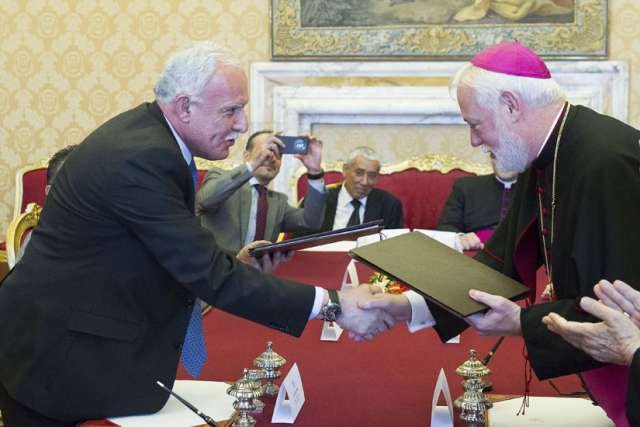Formally titled the “Comprehensive Agreement between the Holy See and the State of Palestine,” the treaty, announced last June pending ratification, covers several aspects of co-operation between the Vatican and Palestine. The most significant sections ensure religious freedom for Christians in predominantly Muslim Palestine, recognize statehood for Palestine and reinforce Vatican support of the elusive two-state solution to end Israeli occupation of Palestinian territory.
Throughout his pontificate Pope Francis has been consistent and unequivocal on the delicate issue of Palestinian-Israeli relations. During a 2014 visit to Bethlehem he reaffirmed in a speech the Vatican’s long-held view that both states have a right to exist. That position was underscored when Francis prayed at the eight-metre wall that divides Bethlehem from Israel and, a day later, when he prayed in Jerusalem at the Holocaust memorial. Soon after his pilgrimage the Pope hosted the Israeli and Palestinian presidents at the Vatican during a day of prayer for peace.
Much as he did in mending fences in 2014 between the United States and Cuba, the Pope has prayerfully encouraged a detente between Israel and Palestine. But that objective took a distressing step backwards Jan. 21 when Israel declared it was annexing 370 acres of prime Palestinian land in the Jordan Valley near Jericho. The olive groves will be permanently settled by Israeli farmers.
In the two years since the latest breakdown of Israeli-Palestinian peace talks, violent confrontations have increased, leading to more than 170 deaths in the last three months alone. This new provocation by Israel, seizing more Palestinian territory, will only fuel enmity and violence and become yet another barrier to peace.
The annexation has been quite rightly denounced by United Nations secretary general Ban Ki-Moon, who called Israeli settlements a violation of international law and counterproductive to Israel’s public support of the two-state solution to help end 50 years of conflict. More than half a million Israelis — and counting — have settled on occupied Palestinian territory. Their presence makes peace difficult, if obtainable at all.
Following a recent expedition to the Holy Land by bishops from 13 countries, including Canada, the bishops said the ongoing occupation “eats away at the soul of both occupier and occupied.” They urged world leaders to renew efforts to negotiate a diplomatic solution that will end the occupation and bring peace.
Israel’s annexation of more West Bank land is an affront to those aspirations and a trespass which the world community should strenuously denounce.


